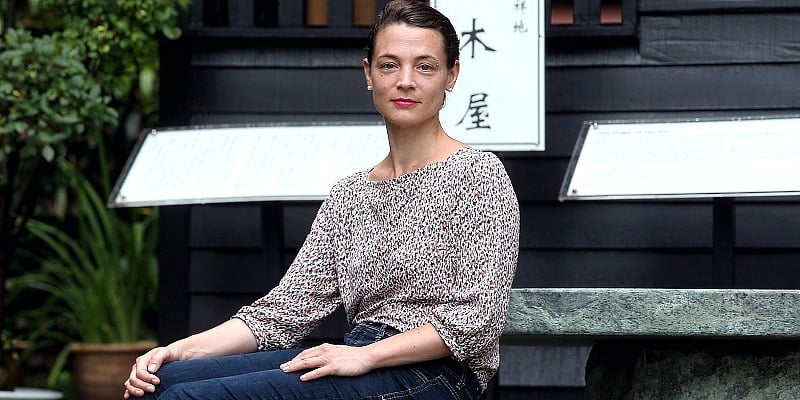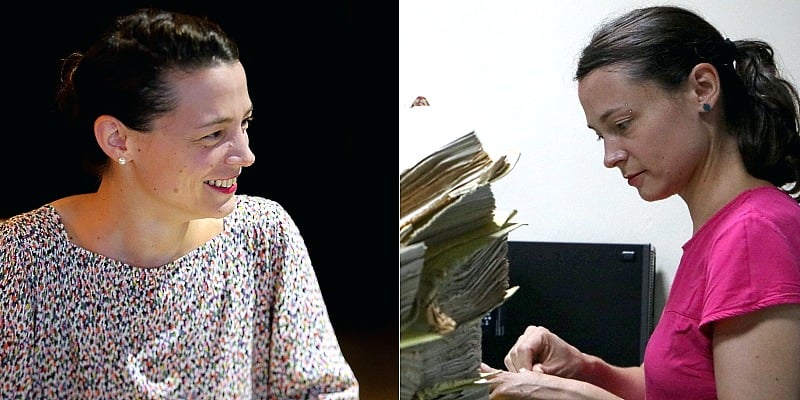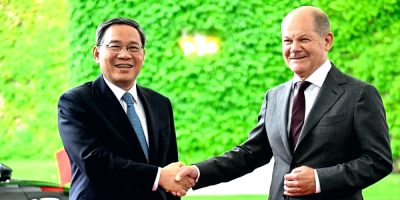To Chinese Malaysians, new village makes a well researched academic subject, but how would a foreign Sinologist view our unique form of settlement?
German Ryanne Flock arrived in Malaysia last October for her doctorate research, eager to explore what kind of spatial and social interactions Chinese new villages would have with the country’s continuous urbanization drive.
Having spent two months here, Flock was generally impressed by the new villages, although there was something she couldn’t quite understand: why is it that many young Malaysians opt to leave the new villages?
From the perspectives of a German, isn’t it great being able to design your own house and have your own backyard?

First encounter with Chinese culture
To the Germans, Chinese is a very difficult language to learn, and whenever they try to describe something they can’t fathom, they will tend to say: Are you talking Chinese? I don’t understand what you’re talking about!
Unlike her fellow countrymen, Flock speaks fluent Mandarin Chinese with noticeable absence of foreign accent!
Her first encounter with the Chinese culture was from the kungfu movies of Jackie Chan and Jet Li during high school. It was the Chinese movies that drew her to the language and culture.
When she was still a high school girl at the age of 16, she took a semester of Chinese at a local university in her native state of Saarland, and she made up her mind to do a Sinology course after high school.
Studying Sinology was a tough decision to make for anyone, for the simple reason that China was relatively undeveloped at that time. Many people told her learning Chinese would not do her any good and she’d better pick another more useful course instead.
Flock later pursued a course in China Studies, Sociology and Economics at Free University of Berlin and Humboldt University of Berlin. Of the three disciplines, she felt the strongest sense of achievement with Sinology.
From China to Malaysia
Flock was born and raised in a tiny town in the state of Saarland where, according to her, life was rather monotonous. Because of that, she had had the idea of traveling overseas some day to experience the exotic cultures of the big, big world outside, in particular the Chinese culture of Asia.
She traveled to China for the first time in 2003 for holiday, and was later an exchange student at Yangzhou University.
While doing her doctorate program, she took part in the megacity research project at Sun Yat-sen University in Guangzhou, and spent a total of four years there. She is currently doing her post-doctoral research at University of Wuerzburg back in her home country.
Flock has a profound interest in the issue of urbanization. She used to conduct such researches when she was in China, diving into the quaint alleys of Shikumen Linong in Shanghai, exploring what type of people living there, how the neighborhood was run, as well as the impact from China’s dramatic sociopolitical transformation on the local community.
And then, she developed an extended interest in the urbanization process experienced in Chinese settlements elsewhere in the region.
That was why she came to Malaysia to visit the Chinese new villages here!
“To be honest, I hardly learned about ‘new villages’ before,” she admitted.
Although she was aware that there was quite a sizable Chinese population in Malaysia, she knew very little about the history of Chinese Malaysians.
She first heard about the new villages of Malaysia from UKM’s social anthropologist Prof. Datuk Dr. Shamsul Amri Baharuddin who was introduced to her by a Southeast Asian colleague while she was a course coordinator at Goethe University in Frankfurt am Main. The professor suggested that she visit the new villages in Malaysia.
Fascinated
She flew into Kuala Lumpur last October, and visited the new villages in Jinjang, Serdang, Ampang and Jenjarom.
Talking about her first impressions of new villages, her eyes instantly glistened with amazement, for what she observed at these new villages was far different from what she saw in China.
“I could see that religion plays a very important role here. There are Datuk Kong shrines everywhere! The moment you enter a house, you are bound to see an altar and offering table, while outside the residential houses there are plenty of little shrines and tanghao (family tablets) which I never came across in Guangzhou!”
Although these new villages look grossly outdated compared to emerging housing estates, to Flock it was more fascinating than being old-fashioned, because the new village is a kind of community that exudes an overwhelming sense of humanness.
Another thing that struck her was the dialects spoken in the new villages.
When she was in China, almost everyone was speaking in Putonghua (Mandarin Chinese), and she only came to realize how important dialects were in everyday life after setting foot on the new villages here.
To her, that is something truly “fascinating,” even though she couldn’t understand a word of the dialects.

Why no young people here?
She spent almost two months in Malaysia, putting up at budget hotels in KL’s Petaling Street and Chow Kit initially before settling down in Jinjang new village.
While she admitted that she loved the place, she couldn’t understand why young people were leaving the new villages instead of moving into them.
She said more and more young Germans today are quitting the overcrowded and restrictive cities for the countryside.
In her home state of Saarland, for instance, there was a strong bond between the local residents and their homes, as everyone yearns to have their own houses with spacious yards.
“From our perspectives, isn’t it better to design and build your own house?
“Moreover, some of the new villages here are pretty close to the city center. When I first arrived here, I really couldn’t understand why there weren’t many households with children living there.”
Flock was also perplexed why people found it unbelievable that she had traveled here all alone to do the research, and had warned her to be extra careful.
She couldn’t understand why everyone seemed to stress the issue of safety, as safety concern exists anywhere in this world.
She later found out from the local residents that they did not think their new villages were unsafe. She was just curious what made some people think otherwise.
Having observed the life in new villages for some time, she could see the many problems plaguing these settlements, including garbage disposal and sewerage.
“But overall, I’m still impressed by what I see here!”
Fruitful trip
As a matter of fact, her research in Malaysia was only part of a much bigger research project “World-making from a Global Perspective: A Dialogue with China.”
Her research was currently still at a preliminary stage and her main purpose was to collect information and conduct field study here. To this end, she has visited Sin Chew Daily a number of times to look up for information on Malaysia’s new villages.
Flock’s Sinology colleague doing a research on Taiwan was impressed by her works and the exciting discoveries she made here. She was convinced that she had made the right decision of coming to Malaysia.
Language is the biggest obstacle in her research in Malaysia because she found it hard to communicate with the older residents in new villages as she couldn’t understand any Chinese dialect, while she also couldn’t read the local official files written in Malay.
As such, she said she was looking for a language school where she could learn the Malay language even though she knew very well it was impossible for her to master the language within a short period of time.
Despite the many challenges she was encountering here, Flock felt that doing research here was relatively easy compared to Mainland China. She said when she told people what she was doing here, most Malaysians would understand her, but in China, people simply appeared to be indifferent or uninterested.
She went back to Germany with piles of books and information on Malaysian new villages in late December, and hopes to come back here in the first half of 2023 to continue with her research works.
Recalling what she had learned these past two months, she concluded, smilingly, “I Should have come here much earlier!”
ADVERTISEMENT
ADVERTISEMENT








































